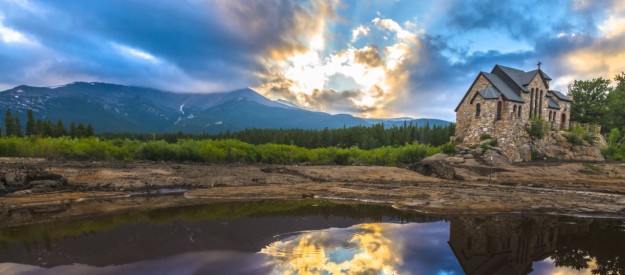"We are losing our attitude of wonder, of contemplation, of listening to creation and thus we no longer manage to interpret within it what Benedict XVI calls 'the rhythm of the love-story between God and man.'"
+ Pope Francis
A time to celebrate creation—at Mass

The Book of Ecclesiastes tells us that “there is an appointed time for everything, and a time for every affair under the heavens.” And now for the second year, Pope Francis is urging the Church to join a long-celebrated ecumenical observance of the wonders and the fragility of the garden that God has given us.
The Season of Creation begins on September 1st, which was proclaimed as the World Day of Prayer for Creation, or Creation Day, by Ecumenical Patriarch Dimitrios I in 1989. Other Christian churches throughout Europe joined the Orthodox observation.
The Season runs until October 4th, the Feast of St. Francis of Assisi.
This will of course be a time for many activities around the world, but organizers (including Rome) are eager that we make the Season of Creation a time of prayer. To help, they've provided resources, such as this suggested Eucharistic Adoration service. This focus on the contemplative is especially meaningful given the Season's ending feast date.
In calling to mind Francis of Assisi—the patron of ecology who taught through his actions about a life of simplicity and giving—we should be reminded that he, like all saints, are role models for what it means to be Catholic and, for the purposes, of the Season of Creation, a Catholic ecologist. The lives of all saints show us that it is the overcoming of self that allows us to change our ways sufficiently for the good of the world. John the Baptist famously proposed that he must decrease so that Christ may increase.
This is the formula that saves souls and words.
Three decades before John the Baptist prepared the way for the Lord, the Blessed Mother did so in a way that no other human has or could or ever will again.
It is from Mary’s supreme example and through her intercession—especially in meditating on Christ’s life in the Most Holy Rosary—that all Catholics can better fathom the great dignity of the created order and its importance to the Creator. As she did at Cana, Mary can bring our worldly troubles to her son, urging Him to transform them and us as He did water into wine. “Do whatever he tells you,” she told the waiters at the wedding. Her advice to us is the same. And so we heed Christ’s commands—especially for the sharing of His Eucharistic body and blood, which we do in remembrance of Him.
Indeed, as we have learned from the Blessed Mother and all saints, to be closest with Christ in this fallen world means to participate in the great mystery of the Mass—the event that is, to borrow the young Fr. Joseph Ratzinger’s words, divinity’s way of loving in the present.
For Catholics celebrating the Season of Creation, the Mass must be the beginning, center, and ending of all human activity intended for the protection of the natural and human environment. When considered in this way, the prayers of the Mass take on added meaning—as they should whenever we consider that all true liturgies and all offerings of grace are divine dialogues with creation with the intention of transforming it.
For those seeking to protect life and order on earth, this dialogue is uniquely apparent in one particular version of the prayers of thanksgiving said during the Mass. These words take on a special meaning during the Season of Creation because they echo ones written by the fourth century St. Basil the Great.
Although born to a wealthy family, St. Basil eventually sought the quiet minimalism of nature. In doing so, he not only contemplated the great mystery of the Creator, but he defended tirelessly the orthodoxy of the Christian faith, giving us words today that should speak to the hearts of all Catholic ecologists.
We give you praise, Father most holy, for you are great, and you have fashioned all your works in wisdom and in love. You formed man in your own image and entrusted the whole world to his care, so that in serving you alone, the Creator, he might have dominion over all creatures. And when through disobedience he had lost your friendship, you did not abandon him to the domain of death. For you came in mercy to the aid of all, so that those who seek might find you. Time and again you offered them covenants and through the prophets taught them to look forward to salvation.
And you so loved the world, Father most holy, that in the fullness of time you sent your Only Begotten Son to be our Savior. Made incarnate by the Holy Spirit and born of the Virgin Mary, he shared our human nature in all things but sin. To the poor he proclaimed the good news of salvation, to prisoners, freedom, and to the sorrowful of heart, joy. To accomplish your plan, he gave himself up to death, and, rising from the dead, he destroyed death and restored life. And that we might live no longer for ourselves but for him who died and rose again for us, he sent the Holy Spirit from you, Father, as the first fruits for those who believe, so that, bringing to perfection his work in the world, he might sanctify creation to the full.
Visit the Season of Creation website to learn more about events occurring around the world, and to add your own.


















